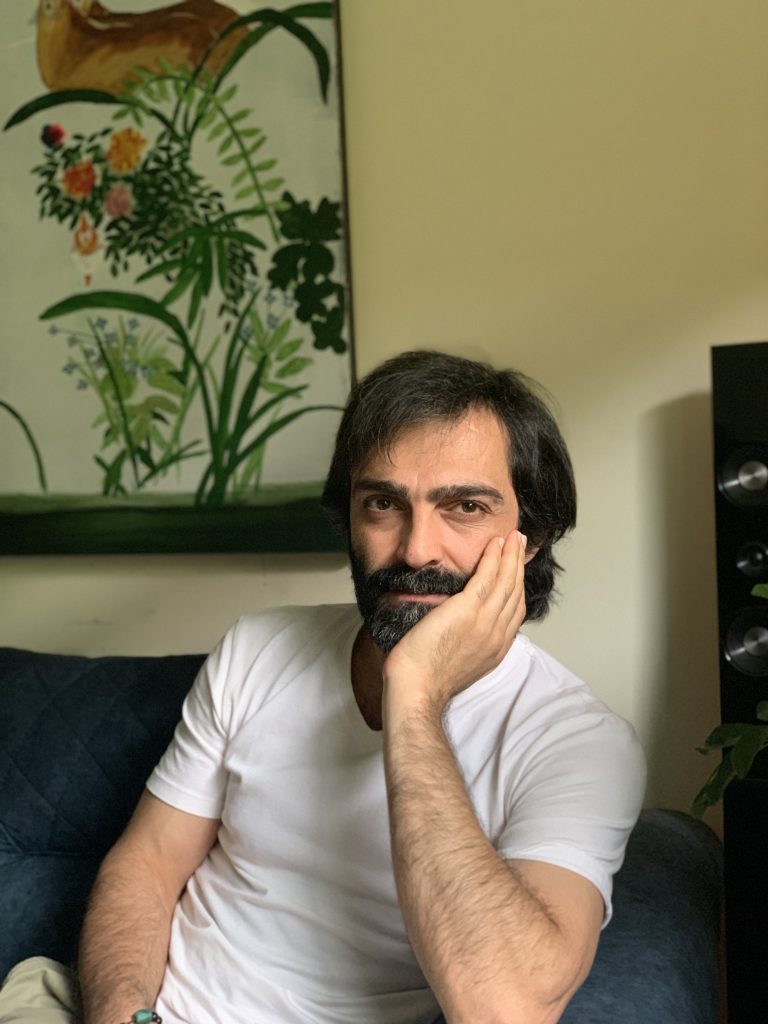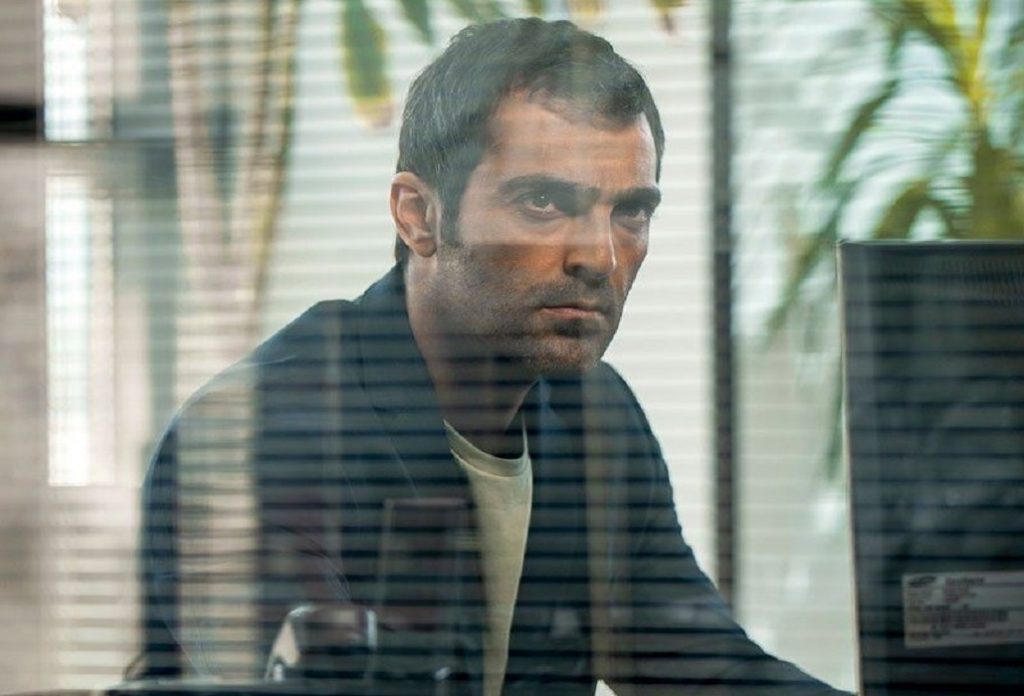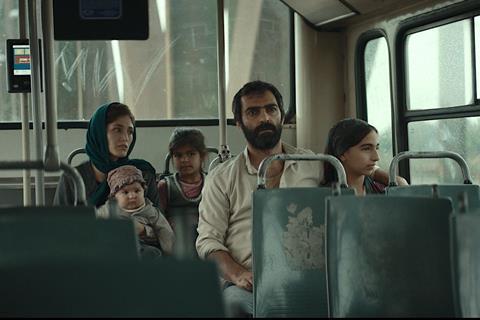By Ali Moosavi.
The road I have travelled on has been a tumultuous one. Some things that I could only dream about in my day-to-day life, I could experience in the lives of the characters that I played. Those feelings of rage and anger, that if you display them in real life, you could be in trouble with the law, you have a chance to exhibit them while acting. You would look for any similarities in sources of anger between the character and yourself.”
Though Reza Akhlaghirad has been working in Iranian cinema, TV and theatre for over two decades, it was only in 2017, when he played the lead role in Mohammad Rasoulof’s Cannes prize winning A Man of Integrity (see top image), that he was noticed by cinephiles. Akhlaghirad’s second collaboration with Rasoulof, the Cannes prize winner and Academy Award nominated The Seed of the Sacred Fig, in which he had a key role, firmly established him with those following Iranian Cinema. Though neither of Rasoulof movies received a public screening in Iran, they were widely watched by Iranians on the internet. However, what made Akhlaghirad a household name in Iran was his appearance in the hit TV series Aban, playing alongside Iranian Cinema superstars Shahab Hosseni (A Separation, The Salesman) and Amin Hayayee (The Last Snow, Flaming). His latest film, Cinema Jazireh (Gozde Kural) was premiered at the 2025 Karlovy Vary International Film Festival.
I got to know and become friends with Akhlaghirad at the 2027 Cannes Film Festival. He is a very kind, modest person, now trying to come to terms with his newfound fame. He is also extremely polite and refers to colleagues as Mr. Rasoulof, Miss Golestani, etc. Throughout his acting career, he has shown that he is indeed a man of integrity. He has always held up his principles without fear. When Mohammad Rasoulof was officially banned from making movies, Akhlaghirad chose to work with him in difficult circumstances rather than take well-paid acting jobs in mainstream cinema and television. As a result, he did suffer the consequences and was out of work for long periods. Happily, it seems that all that is behind him now and he is in a position to pick and choose from the many offers that he receives. He has the look and features of the traditional leading man in cinema and proven acting ability to go with it.
When did your interest in cinema and acting start?

When I was ten years old, I started painting. In fact I’ve started that again (his paintings adorn the walls of his modest apartment in Tehran). Then I started watching films and suddenly the world of cinema became my primary interest. I felt that it was something that I wanted to pursue in future. Whether academically or trying to get a job in cinema, I wasn’t sure, but first, after finishing high school, I had to go and do my military service.
Did you get to do any acting during your military service?
Yes, by chance! They asked if anyone was interested in acting and I put my name forward. There was a group of us, complete amateurs without an assigned director. It was there that I first went on stage, performing in a play for the families of those army personnel living near our barracks. After the military service I got a blue-collar job. I worked in a factory during the day and after work would rehearse with a local theatre group. This carried on for three years and then I decided to give up work and study acting at university.
How much acting did you get to do at university?
A lot. I was always rehearsing or acting in plays, a few of which were selected to be performed at national theatre festivals. Towards the end of my course, I started getting small roles in cinema and television. I did a variety of behind-the-scenes jobs, such as set decoration and assistant director. I also made a few documentaries which I have kept in my archives and not submitted anywhere for screening.
How do you prepare for a role?
Most of the parts that I have played have been people who you can find the likes of in our society, and I have tried to study them. Also, on many occasions I have tried out the experiences that the character has gone through. For example, when I played a recovering addict, I stayed in an addiction rehabilitation center. When I played a medic, I spent time with doctors in a hospital. One of the things which is important for me is to find what makes that character tick, what is the main issue he is grappling with and try to put myself in his position. When I was playing Reza in A Man of Integrity, I had to understand the source of his anger to define his behaviour. I have to act how he behaves physically and feel what goes on inside his mind. I have to find similar traits between his character and mine. If there are none, then I would add certain features so that when I portray the character, it would first of all be believable to myself. Then I feel that it would also be believable for the audience. The most important thing for me is to act in a way that looks as though I am that character and not acting that part.
How has your definition of and approach to acting changed throughout the years; from when you first started acting as a teenager, then during military service, later at provincial theatre and finally as a professional actor?

Naturally as I have travelled this road of my acting life, encountering situations and challenges on the way has affected my viewpoint and approach towards acting. Initially acting for me was something attractive and exciting. Now, when I look back, I can see that it was a safe place for me. Performing in front of an audience and their appreciation was exciting for me. Later, when I studied acting at college, I felt that I should also have an academic outlook towards acting. But I also felt that acting for me was hugely therapeutic because many of the characteristic phases that I was going through, which for me were unknown and scary, I could understand better through my psychological study of people when preparing for various roles. At the same time, I would be confronted with many issues and problems, which either affected me personally or impacted society as a whole. I live in a country where we encounter issues and challenges on a daily basis. All these can affect us in different ways. The road I have travelled on has been a tumultuous one. Some things that I could only dream about in my day-to-day life, I could experience in the lives of the characters that I played. Those feelings of rage and anger, that if you display them in real life, you could be in trouble with the law, you have a chance to exhibit them while acting. You would look for any similarities in sources of anger between the character and yourself.
Now that I look at myself, I see that one has different needs. One part of me was satisfied with the performing. But to satisfy my other needs, I made documentaries, started painting and took long walks and hikes. Though acting is now my profession, it must be something that enables me to be involved in projects that challenge people and provide food for thought and discussion. Whether the final product achieves that is something that I don’t have a big part in play in. But I do my best to select projects that at least have the potential to be works that occupy a part in people’s memories.
Initially acting for me was something attractive and exciting. Now, when I look back, I can see that it was a safe place for me.”
A Man of Integrity was a defining film for you. How did you get the leading part in it?
It was by chance. I wasn’t even aware of it! I was in Istanbul and met Daryoush Ebadi (Production Manager on A Man of Integrity). We used to just chat about this and that. He told me to get in touch with him when back in Tehran. I did and there he told me and he and Rasoulof had seen one of my films in a film festival in Germany and thought I would be suitable for the part of Reza in A Man of Integrity.
You’ve now made two films with Rasoulof: A Man of Integrity and The Seed of the Sacred Fig. What can you tell me about his directing method, especially directing actors?

I think first of all he takes a lot of care about casting. With proper casting, you’re already part of the way there. All the actors bring with them something that adds to the film. In his films Rasoulof focuses more on the content and structure of the film, rather than on specific traits of individual characters. So the actors possibly do not get to go into too much detail regarding their character’s individual characteristics and idiosyncrasies. Perhaps the character played by Soheila Golestani in The Seed of the Sacred Fig is an exception, and we see far more of her qualities and attributes than others. In my two experiences with Rasoulof I have noticed that once he sees that you have a good understanding of the character that you’re playing, he gives you minimal directions, just to polish it. In my second film with him, he generally accepted my suggestions as to how I play my character because I was more familiar with his outlook. In my first film though, in the first few days I was very nervous and afraid that he wouldn’t like what I was doing.
I think he deals differently with professional actors and is more amenable to their suggestions and you can see that even the minimal directions that he gives are absolutely correct and vital as even a minor misstep in the actor’s interpretation of the character can prove fatal in our understanding of that character’s feelings. He would just say I think it would be better if you did it this way or something like that. Both my experiences with him were very comfortable and we didn’t have any problems. I felt that we had come to understand each other very well. I think this was due to his total command of the medium; both in his direction and his screenplays which together provide you with a full understanding of the motives of the character that you’re playing.
You also won an acting prize for A Man of Integrity.
Yes, from Antalya Film Festival in Türkiye. Though I don’t have that prize statue anymore.
How come?
After A Man of Integrity was shown at Cannes (without approval of the relevant authorities in Iran), those involved with it were not dealt with very kindly back in Iran. My belongings were confiscated, among them my award statue!
I hope you get it back. But it doesn’t detract from the fact that you are a prize winner.
Yes, you are right. It just gives you an unpleasant feeling, as that statue is a reminder of something that you have worked hard for.
You started acting in the theatre and still do go on stage. How do you find working in the theatre?
I think for a few reasons one cannot accept any offer of a part for a play these days. Nowadays money is the prime consideration and those who invest in theatre productions are mainly concerned with making sure they at least they recoup their investment. Therefore, you must be careful who you work with. I don’t have happy memories of my last theatre experience. In middle of the play’s run they wanted to close it down because it was not making enough money. Therefore I did forego part of my salary to ensure that those working backstage got paid.If I’m working in the theatre, I want to be in an environment where there are not many side issues and I can focus on my performance. Also, some people think that since I do films and TV now, I would not be interested in theatre!
The TV series Aban was a major hit and you played alongside two superstars of Iranian cinema. I think you had played in another film with Shahab Hosseini before. How did you get involved with this series?
I have always admired Shahab Hosseini. After I won the acting prize for A Man of Integrity, the media and many who work in the Iranian cinema stayed silent as the film was not approved by the Iranian authorities. Hosseini, on the other hand, congratulated me on his public Instagram. We did not know each other, and this was very magnanimous of him. Later we met on the development stage of a couple of projects, neither of which unfortunately materialized, but became good friends. Then he directed me in a film called Thakh-e Tavous / The Peacock Throne, which unfortunately has been banned from screening. Though I was initially against playing in TV series, the problems that have been put in front of the independent cinema in Iran and the fact that the mainstream cinema is dominated by commercial comedies or repetitive social dramas, made me consider TV series. I played Shahab Hosseini’s brother, and we have some physical similarities too! The part was well developed, and it turned out to be a pleasant experience. TV series do have certain limitations, they often lack proper scripts and we encountered a few such problems in this series. My part was constantly re-written and dialogues kept being altered on the set, but overall it was a worthwhile experience. Shahab Hosseini is a great guy and was always helping less experienced and younger actors who were playing against him.
Although I have always been skeptical about TV series, if the part is interesting, I will do it. Often the world they create in TV series has nothing to do with the real world. I prefer working in cinema because at least they paint a more realistic picture of our society.
After the huge popularity of the series Aban, you are a very recognizable face. How are you dealing with this fame?
This was exactly the biggest worry in my life. Although when I started acting in my youth, I yearned to achieve fame, then as I progressed through my career, I preferred to remain anonymous. I just wanted to do my work, enjoy it, then go home and get on with my life. This TV series changed everything. The first few days after the series broadcast, I was a bit apprehensive and was vary of being recognized in the streets. I felt I no longer had the security that I had enjoyed as I love to go fo long walks. But then, at a certain point I told myself that in every profession there is a price to pay for success, and I came to terms with it. I reasoned that people are living their lives and I should just relax and not bother myself when folks come and talk to me. But it was hard getting used to it.
What have you been in lately?

Cinema Jazireh, was recently unveiled at the Karlovy Vary International Film Festival. It’s made by the female Turkish writer-director, Gozde Kural. She spent many years doing research in Afghanistan to write the script. It takes place in Afghanistan a few days after the Taliban come to power. The story concerts a woman whose communist husband has been killed and she is now searching for their child who is missing. However, since women are not allowed to wonder around in the streets, she has to dress as and pretend to be a man. I play an Afghan man and speak with a Kabul accent.
Also, in Dwelling Among the Gods (2024), made in Belgrade by the Serbian director Vuk Rsumovic, I play another Afghan man. The film is based on real events concerning an Aghan refugee family in Serbia.
Do you watch many movies?
Yes I do; I saw a good one last night: The Worst Person in the World by Joachim Trier. I also watch a lot of documentaries.
You mentioned that the film you made with Shahab Hosseini was banned and not shown. Any of your other films have been forced to sit on the shelf?
To be honest, I’ve lost count! I think seven or eight films! One was called The Driver and the Pianist. I played the driver. The story took place during the course of one night where a girl pianist and a group of musicians are being driven around in a city trying to find a place to record their music. The driver and the pianist have different viewpoints regarding music and through the course of the night and their discussions, they come to understand each other better. I firmly believe though that all forms of art, if deserving, will not remain unseen by those who seek it.
Ali Moosavi has worked in documentary television and has written for Film Magazine (Iran), Cine-Eye (London), and Film International (Sweden). He contributed to the second volume of The Directory of World Cinema: Iran (Intellect, 2015).

